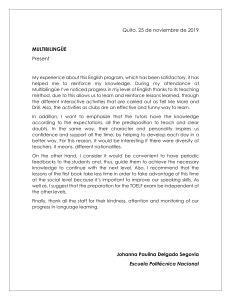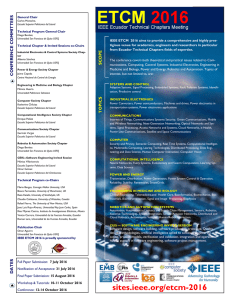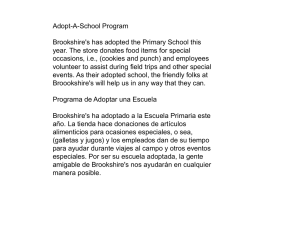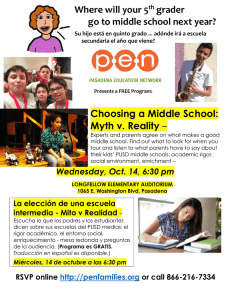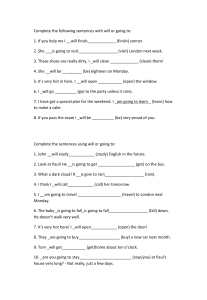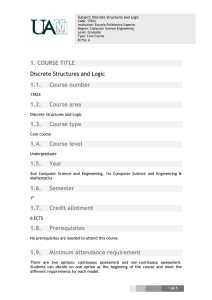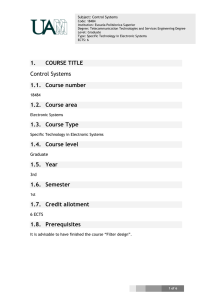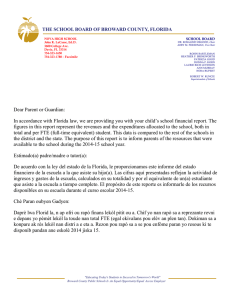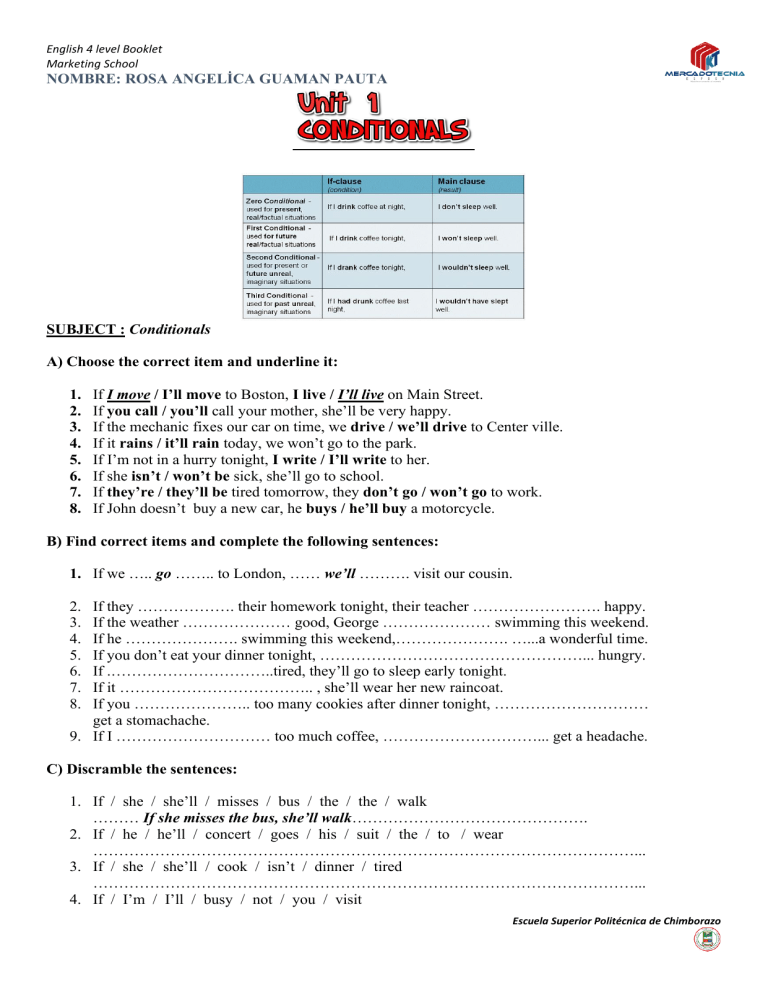
English 4 level Booklet Marketing School NOMBRE: ROSA ANGELİCA GUAMAN PAUTA SUBJECT : Conditionals A) Choose the correct item and underline it: 1. 2. 3. 4. 5. 6. 7. 8. If I move / I’ll move to Boston, I live / I’ll live on Main Street. If you call / you’ll call your mother, she’ll be very happy. If the mechanic fixes our car on time, we drive / we’ll drive to Center ville. If it rains / it’ll rain today, we won’t go to the park. If I’m not in a hurry tonight, I write / I’ll write to her. If she isn’t / won’t be sick, she’ll go to school. If they’re / they’ll be tired tomorrow, they don’t go / won’t go to work. If John doesn’t buy a new car, he buys / he’ll buy a motorcycle. B) Find correct items and complete the following sentences: 1. If we ….. go …….. to London, …… we’ll ………. visit our cousin. If they ………………. their homework tonight, their teacher ……………………. happy. If the weather ………………… good, George ………………… swimming this weekend. If he …………………. swimming this weekend,…………………. …...a wonderful time. If you don’t eat your dinner tonight, ……………………………………………... hungry. If .…………………………..tired, they’ll go to sleep early tonight. If it ……………………………….. , she’ll wear her new raincoat. If you ………………….. too many cookies after dinner tonight, ………………………… get a stomachache. 9. If I ………………………… too much coffee, …………………………... get a headache. 2. 3. 4. 5. 6. 7. 8. C) Discramble the sentences: 1. If / she / she’ll / misses / bus / the / the / walk ……… If she misses the bus, she’ll walk………………………………………. 2. If / he / he’ll / concert / goes / his / suit / the / to / wear ……………………………………………………………………………………………... 3. If / she / she’ll / cook / isn’t / dinner / tired ……………………………………………………………………………………………... 4. If / I’m / I’ll / busy / not / you / visit Escuela Superior Politécnica de Chimborazo English 4 level Booklet Marketing School ……………………………………………………………………………………………... 5. If / you / you’ll / be / don’t / school / finish / sorry ……………………………………………………………………………………………... 6. If / he / he’ll / a / get / good / hard / job / works ……………………………………………………………………………………………... F) Complete the sentences with these phrases: * If I had a motorbike * If I lost all my money * your English would improve * If Peter ate less * I’m sure she’d tell me * If I were a famous model * my uncle would stop too * my English teacher would be surprised 1. If you practiced more, ……. your English would improve. ……………………………… 2. ……………PAST SIMPLE……………………………….., it would be easier to go and visit my friends. 3. ……………………………………………………………………., I would feel miserable. 4. If I started writing poetry, ………………………………………………………………… 5. ……………………………………………………………………., he wouldn’t be so fat. 6. If my little sister did something wrong, ………………………………………………….. 7. …………………………………………………, people would see my photo everywhere. G) Complete the sentences. Use the correct form of the verbs in brackets: Example: I’m not ill, but if I ….. were ….. ill, I wouldn’t go ….. to school. (be / go) 1. The weather report says there will be snow tomorrow. If it ………………………………., I ………………………………………… at home. (snow / stay) 2. Do you need some money? Let me look in my pockets. If I ………………………………. some, I …………………………………………. you some. (have / lend) 3. No, sorry. I haven’t got any money with me. But you know I …………………………….. it to you if I ……………………………………… any. (give / have) 4. I’m sure of it. You ……………………………………. the test next week if you ………... ………………………….. hard. (pass / study) 5. Would you like to go to the cinema? If you ………………………………… to go, I ……………………………………. with you. (want / come) H) What would you do in each situation? Write UNREAL PRESENT situations. * call an ambulance * complain to the manager * try to catch it * ring the police * walk to the nearest garage to get some * run away 1. You find a fly in your soup. If I found a fly in my soup, I would complain to the manager. 2. You see a burglar breaking into your house. ……………………………………………………………………………………………….. 3. You see a mouse in your kitchen. ……………………………………………………………………………………………….. 4. Your car runs out of petrol. ……………………………………………………………………………………………….. Escuela Superior Politécnica de Chimborazo English 4 level Booklet Marketing School 5. You see an accident. ……………………………………………………………………………………………….. 6. You see a ghost in your room. ………………………………………………………………………………………………. I) Put the verbs in brackets into the correct tense: Sarah is a bored teenager. If she …. joined… (join) a club, she ……………………… (make) more friends. She ………………………………. (enjoy) herself if she …………………….. (go) out more. Her schoolwork is suffering too. If she ………………………………….. (study) more, she ………………………………….. (have) better marks and she ………………………. (enter) university. Unfortunately, she is becoming overweight. She ………………………………. (feel) fitter if she ……………………………….. (start) swimming, and she …………………….. (get) thinner if she ……………………………… (stop) eating so much chocolate. L) Finish these sentences: 1. If you drive very fast, ………………………………………………………………………... 2. Would you give me some money if …………………………………………………………. 3. If she were my sister, ………………………………………………………………………... 4. I would spend every winter in Miami if …………………………………………………….. 5. If they have time tomorrow, ………………………………………………………………… 6. Don’t give him anything if ………………………………………………………………….. 7. We would go to the cinema if ………………………………………………………………. 8. If John worked harder, ……………………………………………………………………… 9. They would find me if ………………………………………………………………………. 10. If I had a lot of money, ……………………………………………………………………… 11. You could live more comfortably if ………………………………………………………… 12. If she were a good girl, ……………………………………………………………………… 13. If she goes to his office, …………………………………………………………………….. 14. She would enjoy the party if ………………………………………………………………… 15. If I weren’t busy, ……………………………………………………………………………. SUBJECT : Conditionals A) Use the correct tense: 1. He ……………………………… (not / live) in İstanbul if he ………………… (hate) it. 2. If you …………………………… (write) the letters, I ……………………… (post) them. 3. If you …………………………… (not / leave) immediately, I ………………………. (call) the police. 4. If he …………………………….. (not / arrive) soon, we ………………………. (have to) have dinner without him. 5. I …………………………………… (not / have to) borrow any money from you if I …………………………… (get) my salary tomorrow. 6. If you …………………………… (invite) her to the dance, she ………………………(be) very pleased. 7. If you ………………………… (retire) soon, you …………………………….. (make yourself ill. Escuela Superior Politécnica de Chimborazo English 4 level Booklet Marketing School 8. If you ………………………………. (write) him a letter, he ……………………….. (know) our address. 9. If the policeman had seen the thief, he …………………………………………….. (arrest) him. 10. The buildings wouldn’t have burned to ashes if the firemen ………………………………. (come) in time. 11. People wouldn’t cross the Bosphorus, if they ……………………………………………… (not / build) those bridges. 12. If the family had saved enough money, they………………………………………… (buy) a new flat. 13. If I had known that he was sleeping, I ……………………………………………. (not / disturb) him. 14. If I had lost all my money, I …………………………………………... (be) very unhappy. 15. If you had phoned me before you came, you ………………………………………. (find) me at home. Fill in the correct RELATIVE PRONOUN: 1. Did you see the man …… WHO …… stole her bag? 2. The eggs ………………. you’ve bought are bad. 3. Please give me the keys …………………. are on the table. 4. Is that man ………………….. we saw in the park yesterday? 5. What’s the name of the lady …………………….. babysits for you? 6. Tom is playing with the dog ……………………. lives next door. 7. Have you eaten all the cakes ……………………. I made yesterday? 8. How old is the man ……………………. owns this shop? 9. Let’s all look at the picture …………………… is on page 7. 10. Has Peter returned the money …………………… he borrowed from you? 11. What colour is the dress ………………….. you’re going to wear tonight? 12. The police have arrested the man …………………… murdered his wife. 13. The parcel ……………………. is on the table is your birthday present. 14. Have you met the man …………………. Jackie is going to marry? 15. We will ask the man …………………… delivers our milk to leave an extra bottle. 16. Is she the person ……………………… gave you this record? 17. We spent our holiday in a small town …………………. is near the sea. 18. The man …………………… married Kate is a millionaire. 19. Where are the shoes …………………. I bought this morning? 20. I still write to that lady ……………………. I met twenty years ago. I) Combine the sentences using RELATIVE PRONOUNS: 1. Bob bought the car from a man. The man was the owner of the gallery. …………………………………………………………………………………. 2. The teacher asked me a question. It was taken from a story book. …………………………………………………………………………………. 3. Have you employed the man? I recommend him to you last week. …………………………………………………………………………………. 4. The book was very interesting. I borrowed it from the library yesterday. Escuela Superior Politécnica de Chimborazo English 4 level Booklet Marketing School …………………………………………………………………………………. 5. The girls are my classmates. We saw them at the cinema. ………………………………………………………………………………….. 6. Alex took the gun out of his pocket. He saw the robbers running down the street. ………………………………………………………………………………….. 7. The students missed the quiz. They came to class late. ………………………………………………………………………………….. 8. The flowers are still fresh. I picked them up this morning. ………………………………………………………………………………….. 9. There was a garden here. It was full of green trees. Now there are only two trees. (Relative Clause / Used to) ………………………………………………………………………………….. 10. They played basketball at home. They broke the vase. It was very valuable. (While / Relative Clause) ………………………………………………………………………………….. 11. Gerry works for a company. It makes typewriter. ………………………………………………………………………………….. 12. This is Mrs. Green. Her daughter got married to a drummer. ………………………………………………………………………………….. 13. That man is an artist. I forgot his name. ………………………………………………………………………………….. SUBJECT : Relative Clauses A) Join these sentences using suitable RELATIVE PRONOUNS: 1. We have a neighbour. His dog barks a lot. ……………………………………………………………………………… 2. I don’t know most of the people. You invited them for the party. ……………………………………………………………………………… 3. My cousin is a journalist. Her job is interesting. ……………………………………………………………………………… 4. That’s the parcel. It came in the mail. ……………………………………………………………………………… 5. Do you know the man? I asked him the address. ……………………………………………………………………………… 6. The boy is the travel agent. He is checking the tickets. ……………………………………………………………………………… 7. The gardener’s wife has just had her third baby. She has been married for six years. ……………………………………………………………………………… 8. The horse came in last. You were telling me about it. ……………………………………………………………………………… 9. I can’t remember the town. I was born there. ……………………………………………………………………………… 10. I apologized to the woman. I spilt her coffee. ……………………………………………………………………………… 11. Did you mail the letters? They were on my table. ……………………………………………………………………………… 12. The man teaches at the university. You met his daughter last night. ……………………………………………………………………………… Escuela Superior Politécnica de Chimborazo English 4 level Booklet Marketing School 13. We’re studying science. It helps us to find out a lot about the world around us. ……………………………………………………………………………… 14. The man was very rich. He left a big tip for the waiter. ……………………………………………………………………………… 15. The subject interested everyone. You wrote about it last week. ……………………………………………………………………………… 16. Mrs. Fox belongs to an organization. It assista hospitals. ……………………………………………………………………………… 17. You should go to Dr. Anderson. He’ll give you a common exam. ……………………………………………………………………………… 18. We met a girl. Her name was unusual. ………………………………………………………………………………. 19. The story can’t possibly be true. He told it to us. ………………………………………………………………………………. 20. Did you buy the dress? It was very smart and expensive. ………………………………………………………………………………. 21. That’s the dog. It can understand everything. ………………………………………………………………………………. 22. My friend invited a lot of visitors. His house is very large. ………………………………………………………………………………. 23. The bus was very crowded. I took it this morning. ………………………………………………………………………………. 24. My girlfriend is very beautiful. Her eyes are green. ……………………………………………………………………………… 25. Bring me the books. I forgot them on my table. ……………………………………………………………………………… A) Supply a suitable SIMPLE PAST or PAST PERFECT TENSE: 1. I ………………………. (worry) a lot about her before I ……………………….. (hear) that she was safe. 2. I I didn’t like the flat. It …………………….. (be) much smaller than I ………………….. (think) at first. 3. He told us he ………………………….. (shoot) a big tiger. 4. They ……………………….. (drink) tea after they ………………………………. (finish) dinner. 5. She ……………. just ……………….. (fold) the pink apron and placed it in a table drawer when the door …………………………… (open) and Joe ………………. (enter). 6. The police wanted to know why he …………………………….. (bring) a gun to school. 7. After he ………………………………. (work) at the hospital for two years he ………….. (decide) to give up the job. 8. When I …………………………. (arrive) at the party John ……………. already ……….. (go) home. Escuela Superior Politécnica de Chimborazo English 4 level Booklet Marketing School 9. We ………………………… (wait) until the match …………………………….. (finish). 10. They …………………………… (leave) the room before the meeting …………………… (finish). 11. I ……………………………….. (buy) a new camera before I …………………. (go) to London. 12. I ………………. just ………………… (turn off) the lights when the telephone ………… (ring). B) Supply a suitable SIMPLE PAST or PAST PERFECT TENSE: 1. …………. he …………….. (know) her for a long time before they ……………………… (get) married? 2. He ………………………………. (drive) down the hotel where they ……………………. (spend) their honeymoon years ago. 3. When we ………………………… (get) to the station the train …………………………... (already / leave). 4. He …………………………. (sit) at a table by the window where he …………………….. (have) a meal with Jane. 5. Why ………………. he ………………… (not / ask) her to wait and think again before she ………………………….. (leave) Paris. 6. He was wondering why he ………………………………… (let) her leave so easily. 7. He knew he ………………………………… (earn) that money with a great difficulty. 8. After they …………………………… (go), he …………………….. (sit) down and ……………………… (light) a cigarette. 9. He ………………………….. (have to) go to work by bus because his car ………………. (break) down. 10. He …………………………… (angry) before he ……………………… (hear) my offer. SUBJECT : Reported Speech Escuela Superior Politécnica de Chimborazo English 4 level Booklet Marketing School A) Change the following sentences from DIRECT to INDIRECT SPEECH: 1. He said, “I will be here at noon.” He said that he would be here at noon. 2. Mary said, “The train will probably arrive on time.” ……………………………………………………………………………………….. 3. He said, “I have to finish this report by five o’clock.” ……………………………………………………………………………………….. 4. The doctor said, “Mr. Smith will improve quickly.” ……………………………………………………………………………………….. 5. William said to me, “I am leaving in the morning.” ……………………………………………………………………………………….. 6. The teacher said, “Everyone has to write a composition.” ……………………………………………………………………………………….. 7. John said, “I saw that movie on Wednesday.” ……………………………………………………………………………………….. 8. Helen said, “I have read that book.” ……………………………………………………………………………………….. 9. Mary said to John, “I cannot go to the movie with you.” ……………………………………………………………………………………….. 10. John said, “I have finished studying my lesson.” ……………………………………………………………………………………….. 11. Mary remarked, “John speaks English well.” ……………………………………………………………………………………….. 12. William said to me, “I will not see Mr. Jones until Tuesday.” ……………………………………………………………………………………….. 13. Mr. Smith said, “I will refuse their offer.” ………………………………………………………………………………………. 14. John said, “I certainly hope it won’t rain tomorrow.” ………………………………………………………………………………………. 15. Henry said, “I can meet them later.” ………………………………………………………………………………………. 16. The boy said, “I am only eight years old.” ………………………………………………………………………………………. 17. She said to me, “The lights have gone out.” ………………………………………………………………………………………. 18. The man said, “The telephone is out of order.” ………………………………………………………………………………………. 19. He said, “I will never speak to her again.” ………………………………………………………………………………………. 20. I said to the clerk clearly, “I have already paid that bill.” ……………………………………………………………………………………… B) REPORT what the guests said at a wedding last Saturday: 1. Miss Moore: “They’ll make a lovely couple.” Miss Moore said (that) they would make a lovely couple. 2. Mr. Smith: “They’re going to live in Brighton.” ……………………………………………………………………………………… Escuela Superior Politécnica de Chimborazo English 4 level Booklet Marketing School 3. Mrs.Jones: “The bride and the groom are very nice young people.” ……………………………………………………………………………………… 4. Mr. Roberts: “The bride is wearing a beautiful wedding dress.” ……………………………………………………………………………………… 5. Mr. Clarke: “The couple’s parents look happy.” ……………………………………………………………………………………… 6. Miss Mayall: “The bride’s father has bought them a big flat.” ……………………………………………………………………………………… C) Write sentences about Jane’s trip to Paris: 1. We’re taking the nine o’clock plane. Jane told me they were taking the nine o’clock plane. 2. I’ll have to get up early. She said …………………………………………………………………………… 3. I don’t really like traveling by air. She told me ……………………………………………………………………….. 4. But it’s the easiest way to travel. But she decided …………………………………………………………………… 5. We’re going to spend a week in Paris. She told me ……………………………………………………………………….. 6. I want to go up the Eiffel Tower. She said …………………………………………………………………………… 7. We’ve been to Paris before. She told me ……………………………………………………………………….. 8. But we didn’t see everything. But she said ………………………………………………………………………. 9. I’ll send you a postcard. She said …………………………………………………………………………… 10. But I won’t write you a letter. But she told me …………………………………………………………………… 11. I’m very excited! She said …………………………………………………………………………… 12. We’ll be in Paris tomorrow! The last thing she said was that …………………………………………………… D) REPORT the police-officer’s questions to the shop owner: 1. What’s your name? The police-officer asked him what was his name was. 2. Did you see the robbers? ……………………………………………………………………………………… 3. What were they wearing? ……………………………………………………………………………………… 4. How do you think they got in? ……………………………………………………………………………………… 5. What did they take? ……………………………………………………………………………………… 6. Has this ever happened before? Escuela Superior Politécnica de Chimborazo English 4 level Booklet Marketing School ……………………………………………………………………………………… EDUCATION When children are two or three years old, they sometimes go to a __1__ school, where they learn simple games and songs. Their first real school is called a __2__ school. In Britain children start this school at the age of five. The __3__ year in Britain begins in September and is divided into three __4__ Schools __5__ for the summer holiday in July. __6__education begins at the age of about eleven, and most schools at this level are __7__ which means boys and girls study together in the same classes. In Britain education is __8__ from five to 16 years of age, but many children choose to remain at school for another two or three years after 16 to take higher exams. Most children go to __9__ schools, which are maintained by the government or local education authorities, but some children go to __10__ schools, which can be very expensive. University courses normally last three years and then students __11__, which means they receive their __12__. At university, teaching is by __13__ (an individual lesson between a teacher and one or two students), __14__ (a class of students discussing a subject with a teacher), __15__ (when a teacher gives a prepared talk to a number of students) and of course private study. Most people who receive a university place are given a __16__ by the government to help pay their __17__ and living expenses. 1. A) primary B) nursery C) boarding D) co-educational 2. A) primary B) graduate C) compulsory D) secondary 3. A) academic B) nursery school C) graduate D) co-educational 4. A) fees B) forms C) degrees D) terms 5. A) finish B) break up C) over D) run 6. A) good B) private C) secondary D) higher 7. A) academic B) nursery school C) graduate D) co-educational 8. A) voluntary B) forbidden C) compulsory D) free 9. A) boarding B) private C) state D) secondary 10. A) primary B) private C) state D) boarding 11. A) break up B) practice C) graduate D) lecture 12. A) fees B) tutorial C) degree D) certificate 13. A) discussion B) tutorial C) lesson D) lecture 14. A) lecture B) meeting C) discussion D) seminar 15. A) lecture B) meeting C) discussion D) seminar 16. A) award B) grant C) certificate D) present 17. A) fees B) expenditures C) degree D) total VOCABULARY IRREGULAR VERBS Escuela Superior Politécnica de Chimborazo
